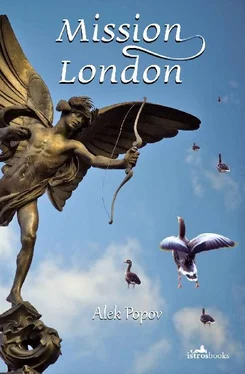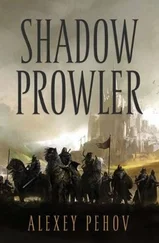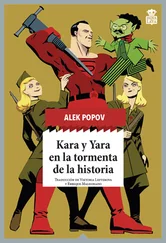He checked the Secret Sector, with the device over his shoulder, but found no change in the parameters of the signal. The bug was obviously not there. That led him to sigh, because the heaviest responsibility no longer sat on his shoulders. From there on, he was eaten only by his own curiosity. Where the hell are you, you old bitch?!
He went down to the floor below, where the signal became perceptibly stronger. Most of the offices were here, including the Ambassador’s, and access was far easier. All sorts of riff-raff came in and out: from Xerox technicians to journalists and dodgy businessmen. He would not have been at all surprised if the bug was somewhere hereabouts. He criss-crossed the corridors but found nothing more concrete. The only person about was Turkeiev, who stared at him with fear and respect. He was not obliged to explain himself, but he decided to test the other’s ignorance, by informing him that he was measuring ‘the electromagnetic background count owing to atmospheric interference’. Turkeiev nodded understandingly, flattered by this demonstration of trust.
The further down he went, the stronger the signal became in his headphones. Racho checked the reception room, as well as its service rooms, but found nothing. In the foyer, he came across Mr Kishev, to whom he gave the same old story about ‘electromagnetic background’. Kishev accepted it without thinking. He had something else on his mind.
Kosta was fussing nervously around the cooker, when the door of the kitchen opened and the radioman entered, headphones covering his ears and some strange device over his shoulder. The cook was neither expecting him nor happy to see him.
“What do you want?” he asked nervously.
The radioman put a finger to his lips and stepped forward. Kosta stepped in front of him, but Racho pushed him aside with a decisive gesture. The cook’s knees went weak. With the unerring sensitivity of a compass, the radioman aligned himself with the freezer.
“What’s in there?” he asked.
“Nothing,” said Kosta, pulling together the last shreds of firmness into his voice.
“Open it!” ordered the radioman.
The cook walked in circles near the freezer, patting his pockets. “Oops, I seem to have forgotten the keys!” he mumbled.
“Listen Pastry,” cut in Racho. “I don’t know what you’re hiding, but I don’t believe you want the entire Embassy to know about it? Come on, open the freezer!”
“There’s nothing in there, mate! Why’re you bugging me?”
“So I should report to the Ambassador then, eh?”
“What are you going to report?” the cook visibly cringed.
“See this little beauty?” Racho said threateningly, “She’ll report, not me!”
The air in the electronics-stuffed van was stale and Nat Coleway went to smoke in the fresh air. He felt totally useless at this stage of the operation, which otherwise rarely happened to him. Dale Rutherford stayed in the van, thirstily watching the radar, along with two men from the special unit for electronic surveillance that had been created in the last 24 hours. The van was parked in front of the gates of Richmond Park, ready to move out the instant Intelsat-2 received a transmission from the birds.
Ray Solo approached the policeman and cautiously asked him, “How is it going?”
“We are waiting,” replied Nat shortly.
Solo had been temporarily relieved of his duties, pending the results of the investigation. The police were working on a theory that someone from Security may have been involved in the robbery.
“Wait until we catch them the filthy bastards!” Ray said darkly.
“How do you know they were more than one?” the detective reacted instinctively.
“I don’t,” he mumbled.
The door of the van opened and Dale stuck his head out of the van. His eyes burned feverishly. “Coleway!” he shouted excitedly. “We’ve got a signal!”
Operation ‘Duck’s Leg’ had been launched two years ago at the instigation of Dale himself after a similar incident in which two ducks had disappeared. All traces of them had also disappeared, despite the fact that they had been tagged in the traditional manner with metal rings that showed exactly where they came from. They had never been found. Dale had taken it badly, but he threw all of his energy into convincing the Park authorities to invest a considerable sum in a new high quality system for tracking the birds. He read a great deal about into the latest developments in the field. The result had been a joint project between Dale’s department and a leading Oxford biotechnology laboratory. Dale’s pets underwent delicate surgical intervention. A microchip was implanted in the ducks’ bodies, which would be activated by any dramatic change or cessation of life. The implant transmitted a signal for several days that could be picked up by satellite. In turn the satellite relayed the signal to a mobile radar station that could locate the exact position of the birds. Unfortunately, the project quickly reached its spending limit and the cutting edge microchip was implanted into only ten birds. One of them had been discovered the previous year in the river Thames, tangled in some spirogyra and although Dale was naturally sad, he had a reason to be proud of himself. The system worked. He had another nine high-technology ducks.
“Where are they?” asked Coleway immediately after the door slammed behind his back.
“Here they are!” Dale pointed at the screen.
The detective sceptically gazed at the faint pulsing point of light.
“Shouldn’t there be more of them?” he asked.
“They are probably piled together. Poor souls!” whispered Dale.
He twiddled a knob and heart-stopping din roared from the speakers.
“Can we pinpoint their location?” asked Nat business like.
“Unfortunately, the signal is quite weak,” one of the men said. “But I’ll try.”
His fingers blurred over the keyboard. A greenish grid appeared on the screen.
“They are in London,” he concluded after a while.
“I knew it!” exclaimed Dale.
“London is fairly big!” Nat cooled his ardour.
“West End,” specified the operator. “That’s all for the moment!”
“Let’s move!” ordered Coleway. “To Fulham!”
He radioed the cars that were waiting in other areas of the capital and told them to regroup in the West End. Nat Coleway was thrilled at the result. He had expected, somewhere in his subconscious, that the birds would be found in some far-flung section of the city, packed with immigrants and other lower-class types, who did not know (or rather did not respect) the cultural norms of civilised society. The fact that the ducks were calling from the prestigious West End gave him cause to smile shrewdly. He had grown up in the East End, not far from Whitechapel, in the back-alley where Jack the Ripper had committed his second murder (the victim had been some great-great-aunt). Despite the fact that he had broken with his roots, Nat had maintained his social awareness, which helped him to deal with the underworld in general. That was why he now felt slightly confused. It seemed to him that the only logical explanation was that the ducks were in the kitchen of some Chinese restaurant or other. The Chinese would go to any lengths to drop their prices and aromatic, crispy Peking duck was the cornerstone of their menu. Elementary, Watson!
The bus made slow progress through Fulham. The spinning antenna on its roof drew the attention of passers-by.
“Kensington,” announced Dale suddenly. “We’re really close! Hold on my ducklings!”
The van turned left in the direction of the Cromwell Road. Nat Coleway radioed his colleagues once more. He remembered a small Chinese restaurant on High St. Ken, with a suspiciously cheap menu and he felt a pang of regret because he himself often dropped by there when he was on duty, to stuff himself to bursting before a long shift. But he couldn’t let up now. The net was drawing tighter.
Читать дальше












